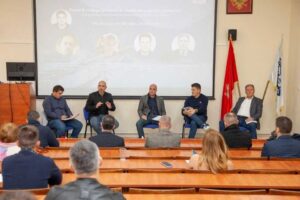
By : Masa Stampic
Master of Humanities in international Maritime Legislation
It is already known that the Maritime Labour Convention – MLC, 2006 has been designed by the International Labour Organisation (ILO) to become an international legal instrument that will be the “Fourth Pillar” of the global regulatory regime for quality shipping, complementing the fundamental Conventions of the International Maritime Organization (IMO), such as the International Convention for the Safety of Life at Sea, 1974, as amended (SOLAS), the International Convention on Standards of Training, Certification and Watchkeeping, 1978, as amended (STCW), and the International Convention for the Prevention of Pollution from Ships, 73/78 (MARPOL).
The MLC, 2006
The MLC, 2006, was adopted by government, employer and worker representatives, widely known as the seafarers’ “Bill of Rights,” it is unique in its effect on seafarers and quality shipowners. They are not just workers and they need special protection from three different aspects: human -worker – seafarer.
The „Light side“ of seafaring
Also, their ship is not just a ship, that is their working place, living place and place for recreation and relaxation. Regardless of the „Light side“ of seafaring like good earnings and comfortable life, the extended period off between voyages, and travelling (if there is time to enjoy it), no one should forget the „Dark side“ of seafaring where the list is bigger: Isolation (ship area, far from family and friends), danger, restrictions (limited social and physical interactions, restricted living space), hard work, difficult to enforce their rights to the court (need for special protection).
The most important actors
The most important actors in practice when applying the MLC, 2006 Convention are shipowners and seafarers. Shipowners are to implement and apply all the MLC, 2006 regulations on board, and seafarers are to respect the established rights and procedures and report any non-compliance.

Regulation 2.3 -working and resting hours
It has been discussed many times, both in public and by seafarers that some shipowners do not follow all the guidelines and rules of the Convention, especially regarding regulation 2.3 -working and resting hours. It is also known and discussed that the hours of rest are insufficient and that fatigue is often present as a consequence since the hours of work are mostly significantly higher than the MLC, 2006 Convention allows.
The research I conducted among the seafarers during 2023
In the research I conducted among the seafarers during 2023, the participants – the seafarers generally stated that the fixed working hours are eight hours per day, including night hours and watchkeeping, and that they all work overtime, mostly daily. Weekly, 90 percent of respondents stated that they had more than 10 hours of overtime work, and even 40 percent more than 20 hours, among which a minority mentioned more than 40 hours. Almost all stated that there are no free days in general.
There is danger posed by fatigue.
According to the given answers as facts, seafarers have stated that resting time is mostly enough to be productive in their jobs, but the possibility of relaxing is minimised. Moreover, they said that there is sometimes danger posed by fatigue.
Irregularities in compliance with MLC, 2006
What happens on the other hand, are the seafarers whose rights were not respected and those who should demand the execution and compensation of their rights as well as the obligations, the same seafarers cover up evidence that points to irregularities in compliance with MLC, 2006 during inspection examination on board in order to protect the shipowners and save them from possible liability or consequences that would arise from mentioned irregularities.
Kotor International Maritime Conference (KIMC)
This is exactly what was discussed on the panel at the Kotor International Maritime Conference (KIMC) in November 2023, where the International Transport Federation (ITF) inspector from Croatia Mr. Peric and ITF representative from Montenegro Mr. Markolovic, mentioned the rigging of working hours and concealment of evidence during the inspection where their objective is to protect the rights of seafarers, the same seafarers do not follow the rules by covering pieces of evidence, while the ITF inspectors are not in the position to help them. The same thing happens during the Port State Control (PSC) inspections when all the irregularities should be pointed out. At the same time, the seafarers from the Seafarers’ Union of Montenegro confirmed that fact.
Related :Seafarers recognized as ‘key workers’ after Geneva negotiations
The duration of the contract
One more linked issue is the duration of the contract. In the same research I conducted in 2023 most seafarers answered that the contracts are long, and from analysis, the duration of the contract is extracted as one of the primary issues to be resolved from the opinion of Montenegrin seafarers. It cannot be expected by the seafarers to work constantly with overtime, without enough resting time, and at the same time expect them to stay on board for 6 or more months.
In the end, there arises a question ” Why do seafarers do that? “
In the end, there arises a question ” Why do seafarers do that? ” The answers could be, first, that the shipowners expect the crew to whom they give the job to protect their interests, and therefore the seafarers could be rewarded in some other way or could be exempted from some possible consequences or penalties measure. It could be that seafarers do this because of the excellent characteristics both from the inspections that come on board and for the shipowners themselves, that is, good recommendations, or to remain in the company or advance faster.
Related : Nouhed Chine writes : Beyond Seafarers’ Rights

The second question would be ” Why is the number of seafarers not higher on board? ” There is no other answer except lower expenses for the shipowners. The conventions give minimum requirements for member states, but in general recommend higher standards, especially when there is a need. In this case, MLC, 2006 is established to ensure the safety and security of the ship and its personnel. It is stated in Standard A2.7.2. that „When determining, approving or revising manning levels, the competent authority shall take into account the need to avoid or minimize excessive hours of work to ensure sufficient rest and to limit fatigue…“. Therefore, that should be adjusted following different circumstances on board the vessels.
After the pandemic Covid 19

After the pandemic Covid 19, seafarers have been declared “Key Workers”, essential actors to the whole world, during the webinar of IMO in 2020. At the same time they are known as the special workers’ category, called “The Heroes of the Sea” by the previous Secretary General of IMO Mr. Kittack Lim. In that case, do these “heroes” navigating on their “slavery ship”, distant from their family and friends, deserve better treatment, that should be the main question for all.
There is no easier way,
It is obvious that sometimes there is no easier way, or simply the possible consequences justify the reactions of seafarers. However, if they do not stand behind themselves and their rights, organizations and associations cannot protect them in any way.
Irregularities must be pointed out in order to be eliminated!





Masha”s article is so articulate, clear, critical, coherent, addresses an important issue for seafarers and answers a long-standing question. 🙏
That is true